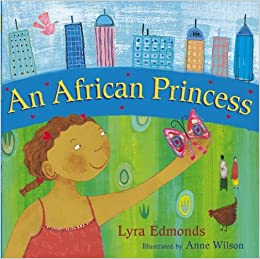An African Princess by Lyra Edmonds
An African Princess was written by Lyra Edmonds. This book was publisher by Candlewick in August 3rd, 2004. It has 32 pages, and suitable for the reading age from 4 - 6 years old.[1]
Summary
A young black girl who got bullied at school, try to find her real identity. Lyra's mama tells her that she's a princess from Africa. But at school, the kids poke fun and call her silly. How many African princesses have freckles and live on the tenth floor? But on a visit to the Caribbean, Lyra meets her Taunte May, who shows Lyra how she is one in a long line of princesses from Africa. Based on author Lyra Edmonds's own life and beautifully illustrated with Anne Wilson's richly textured art, this is the wonderful story of a child who learns to be proud of who she is.[2]
Pros
Maeve shared her fair comment on this book. This book tells about a young girl-descended from an African princess-struggles with her identity. To help, her mother and father take her on a trip to Africa to meet a relative who teaches her to celebrate her heritage.
Another reader named Matthew from the same site had a different point of view about this book, he gave a deep review, he wasn't keen on reading this and although he thought the writing needs some work, the story itself and Anne Wilson's artwork is wonderful. There was a very clever interplay here between text and image and he thought that this offers an engaging and fruitful discussion with children around identity and stereotypes. The story was one in which Lyra wishes to understand her African heritage. Having heard that she was descended from a line of princesses, she was bullied at school for her pomposity and begins to question her mother's words. In order to support her, the family visit her aunt in the Caribbean and discover the truth. What he found deeply powerful were the intrinsic statements make (or not) by Anne Wilson and her art. The bullies were both black and white and Lyra's father is white too. None of this is mentioned in the text and can lead to interesting discussions about presumptive stereotypes.[3]
